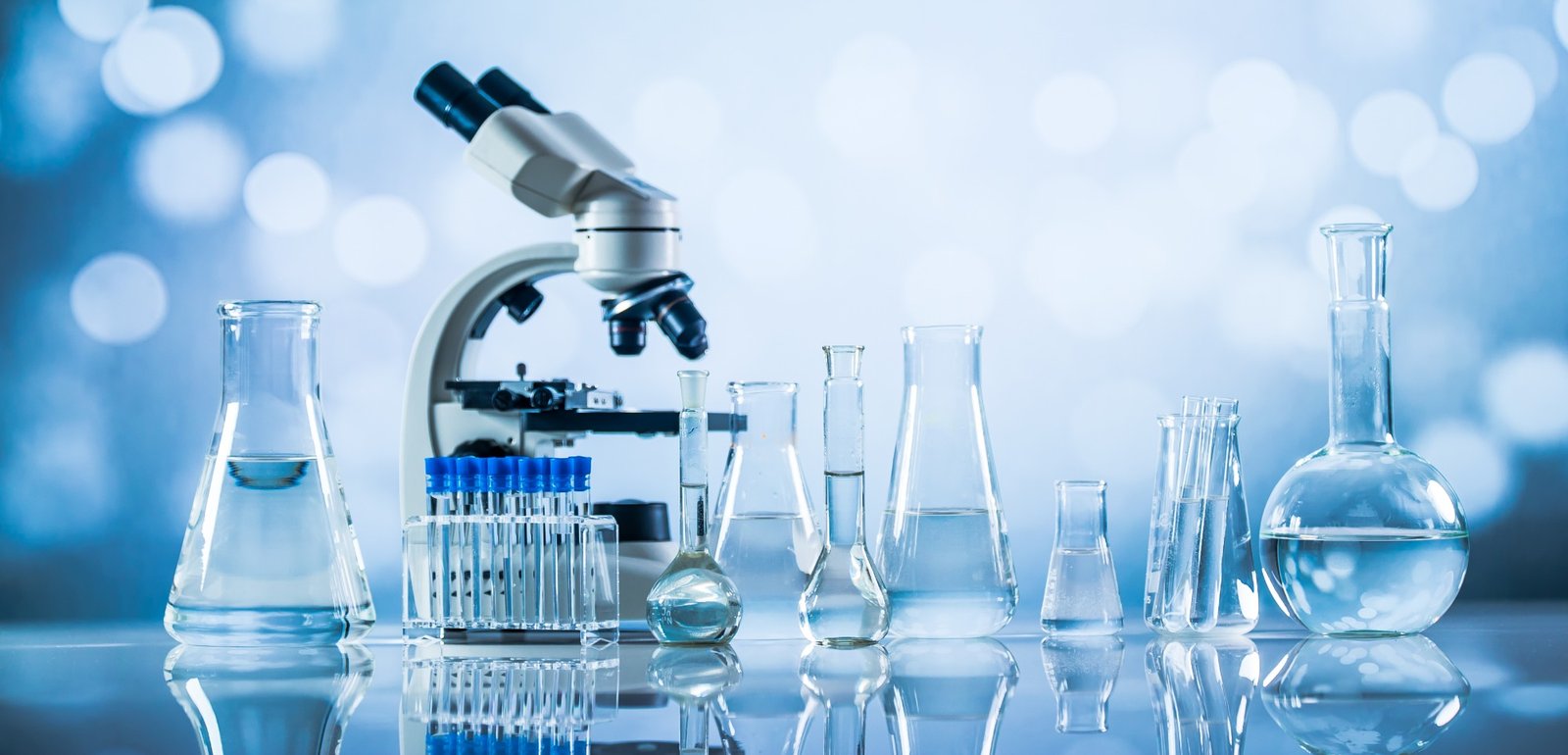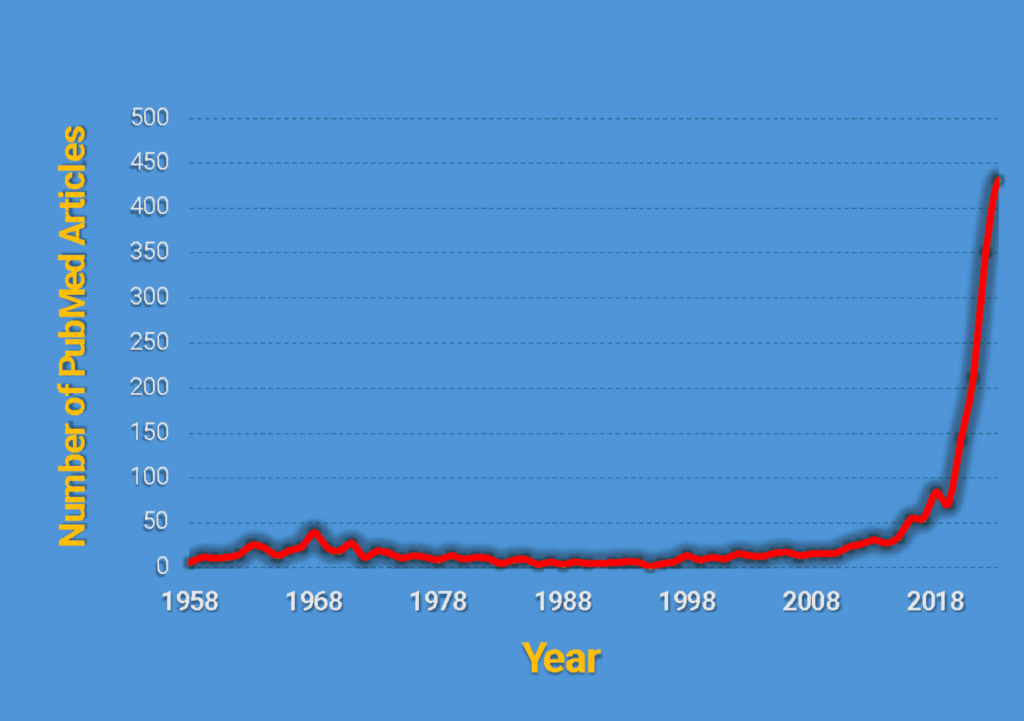
The Latest In Psilocybin Research
Psilocybin Therapy
Psilocybin Therapy uses psilocybin, the active compound in “magic mushrooms,” to address mental health issues. Psilocybin, historically used in spiritual practices, gained scientific attention before being restricted in the 1970s. Since 2020, there have been more than 1300 publications in medical and scientific literature on research and perspectives in psilocybin therapy. Its recent resurgence shows promising results, especially for treatment-resistant conditions.

How Psilocybin Therapy Works
Psilocybin is converted to psilocin, which interacts with receptors in your brain which regulate mood and cognition. This alters brain connectivity, reducing activity in self-reflection and rumination. This can lead to “ego dissolution,” freeing individuals from entrenched thought patterns and encouraging therapeutic breakthroughs.
- Increased global integration in the brain after psilocybin therapy for depression (Nature Medicine, 2022)
- Molecular Mechanisms of Psilocybin and Implications for the Treatment of Depression (CNS Drugs, 2021)
- Psychedelic Psychiatry’s Brave New World (Cell, 2020)
- Psychedelic effects of psilocybin correlate with serotonin 2A receptor occupancy and plasma psilocin levels (Nature Neuropsychopharmacology, 2019)
Psilocybin Therapy Process
Therapy usually involves preparation, the psilocybin session, and integration. In a supportive environment with a therapist, patients may experience intense emotions, altered states, and insights, which are then processed to aid in their mental health journey. Individual therapy may be administered at the discretion of your provider and has been shown to be beneficial for a range of conditions with nascent research demonstrating efficacy for future applications. Many studies have shown that it can serve as a solution for mental health conditions that are resistant to standard treatment.
Therapeutic Applications
Depression and Treatment-Resistant Depression: Studies indicate rapid and lasting symptom relief. Psilocybin has demonstrated improvement over placebo and potentially superior results when compared to traditional therapies such as escitalopram.
- Effect of psilocybin versus escitalopram on depression symptom severity in patients with moderate-to-severe major depressive disorder (The Lancet Discovery Science, 2024)
- Single-Dose Psilocybin Treatment for Major Depressive Disorder (JAMA, 2023)
- Psilocybin-assisted therapy for major depressive disorder (Journal of Psychopharmacology, 2023)
- Psilocybin-assisted therapy for depression: A systematic review and meta-analysis (Psychiatry Research, 2023)
- Effects of Psilocybin-Assisted Therapy on Major Depressive Disorder (JAMA Psychiatry, 2021)
Anxiety (in terminal illness)
Ongoing research shows potential in reducing PTSD symptoms, a condition which has no current medications approved specifically for treatment.
Substance Use Disorders
Promising outcomes in reducing addiction to substances like alcohol and tobacco. Data shows decrease in consumption of both when used with psychotherapy. Further study in other substances is needed though research in nonhuman models suggests potential.
- Psilocybin prevents reinstatement of alcohol seeking by disrupting the reconsolidation of alcohol-related memories (Psychopharmacology, 2024)
- Psilocybin reduces heroin seeking behavior and modulates inflammatory gene expression in the nucleus accumbens and prefrontal cortex of male rats (Molecular Psychiatry, 2024)
- Therapeutic effect of psilocybin in addiction: A systematic review (Frontiers Psychiatry, 2023)
- Percentage of Heavy Drinking Days Following Psilocybin-Assisted Psychotherapy vs Placebo in the Treatment of Adult Patients With Alcohol Use Disorder (JAMA Psychiatry, 2022)
Other Disorders
Additional reports have indicated possible improvement in other specific disorders such as anorexia nervosa, obsessive-compulsive disorder, chronic pain, bipolar depression, and neurodegenerative disorders though further study is needed.
- Psilocybin therapy for females with anorexia nervosa (Nature Medicine, 2024)
- Mechanisms of therapeutic change after psychedelic treatment in OCD (Psychiatry Research, 2024)
- Microdosing psilocybin for chronic pain: a case series (Pain, 2023)
- Single-Dose Synthetic Psilocybin With Psychotherapy for Treatment-Resistant Bipolar Type II Major Depressive Episodes (JAMA Psychiatry, 2023)
- Psychedelic-inspired approaches for treating neurodegenerative disorders (Journal of Neurochemistry, 2021)
Safety and Side Effects
Psilocybin is non-addictive and considered physiologically safe, though it can lead to challenging emotional experiences. Although rare, headache and nausea are the major reported side effects. Therapeutic use should be discussed with your mental health provider especially when using other medications.
- Drug–drug interactions involving classic psychedelics: A systematic review (Journal of Psychopharmacology, 2024)
- Adverse Events in Studies of Classic Psychedelics: A Systematic Review and Meta-Analysis (JAMA Psychiatry, 2024)
- Attenuation of psilocybin mushroom effects during and after SSRI/SNRI antidepressant use (Journal of Psychopharmacology, 2023)
- Drug-drug interactions between psychiatric medications and MDMA or psilocybin: a systematic review (Psychopharmacology, 2022)
- The abuse potential of medical psilocybin according to the 8 factors of the Controlled Substances Act (Neuropharmacology, 2018)
News & Media
Psilocybin remains illegal in many places, classified as a Schedule I substance. However, positive research, shifting public attitudes, and local decriminalization are paving the way for medical acceptance. If further trials confirm its benefits, psilocybin could become a widely available powerful tool with supported legislation. In Colorado, recent legislation has created an environment where therapy will be available in a provider-supervised fashion.
News & Media
- What experts say about taking psilocybin as an alternative treatment for depression (CNN, 2024)
- New research would determine the benefit of psychedelics for treating PTSD and depression in Veterans (VA News, 2024)
- Psilocybin for Mental Health and Addiction: What You Need To Know (National Center for Complementary and Integrative Health, 2024)
- Depression: Five Million Americans May Benefit From Psychedelic Therapy (Newsweek, 2024)
- Psilocybin Could Help Treat Depression, Researchers Find (Forbes, 2024)
- This Is Literally Your Brain on Drugs (The New York Times, 2024)
- Psychedelics could treat some of the worst chronic pain in the world (Vox, 2024)
- The Psychedelic Scientist Who Sends Brains Back to Childhood (Wired, 2023)
- What Does Good Psychedelic Therapy Look Like? (The New York Times, 2023)
- The ‘gnarly and painful’ therapeutic potential of ‘magic mushrooms’ (Los Angeles Times, 2023)
- Could psychedelics help patients in therapy? (TED Talks, 2023)
- This Is Your Brain on Mushrooms: How Does Psychedelic-Assisted Therapy Work? (CU Anschutz, 2022)
